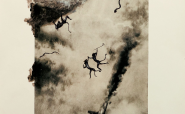| Revista Umělec 2001/3 >> A Liar or a Genius | Lista de todas las ediciones | ||||||||||||
|
|||||||||||||
A Liar or a GeniusRevista Umělec 2001/301.03.2001 Ivan Mečl | reviews | en cs |
|||||||||||||
|
"Rarely does an artist succeed in creating an exhibition in the exact meaning of the word “create.” The word “succeed” is also significant here. Those who wished to experience a metaphor for a personal, creative and mental breaking point may have gone to see the exhibition Sory by Petr Pisařík. Some people, however, didn’t believe it, and considered the exhibition art.
The great watchmaker, who not only fixed broken machines but also invented and built new ones, never lived on our street. His shop was filled with sophisticated and peculiar wonder machines that measured time. Sometimes people weren’t sure if they could still measure such a commonplace thing as time when they were in themselves so unbelievable. One day the watchmaker decided to make a clock tower. A machine that would be a milestone in his professional journey. He announced his intention to everybody in town, and the city hall decided to let him build the tower as his masterpiece. The work would take him months. The watchmaker would use many precious metals and various complex tools to treat them. He would also have to hire several assistants to assemble such a huge machine. The entire city was looking forward to seeing their future pride, and the city councilors prepared a grand opening. Newsletters only exacerbated their impatience; the master himself spared no words of anticipation when meeting his friends. When the day finally arrived, all that was needed was to assemble all the prepared parts and breathe life into the work. But suddenly the master came and abruptly hauled away everything. Those who carried the large reel spindle had to stop and leave it there. The man who was attaching the enormous gear wheel to a spring had to drop it, and it was at such an unfortunate moment that it was left hanging from the tower window on the unwound spring. In the afternoon people gathered under the tower, only to find the clock un-finished. Parts of machines of peculiar shapes were scattered about, silent witnesses to great craftsmanship. The assistants and councilors shrugged their shoulders and made contorted faces of despair, giving the master inquiring looks, wondering if he was going to offer an explanation. They pointed at the expensive parts and the exquisite architecture of the tower. “One day I might finish the work!” the watchmaker shouted after the audience as they were walking away. He then went away too. Soon a rumor flew through town that the master would indeed finish his work. Once again people gathered under the tower. The master climbed up to the top, and shouted down to them, “I’m not finishing it.” Then he went home. After some time, the councilors had a bell installed in the tower and appointed a man to ring it every time somebody died. God knows where the remarkable clock parts disappeared to. I saw all of this and heard even more. One day I ran into the watchmaker. He was just sitting in a cafe, smiling. He noticed my interest in him and invited me to his table. Soon enough our conversation turned to the story of the clock tower. I told him that I was curious and still couldn’t come up with a suitable explanation that I was happy with. The watchmaker turned to me and said quietly: “I’ll tell you the truth…. If you really want to hear it?” I said that I didn’t. "
01.03.2001
Artículos recomendados
|
|||||||||||||









Comentarios
Actualmente no hay comentariosAgregar nuevo comentario